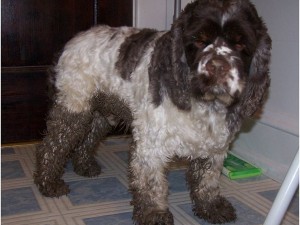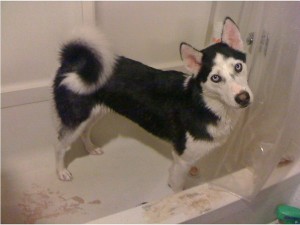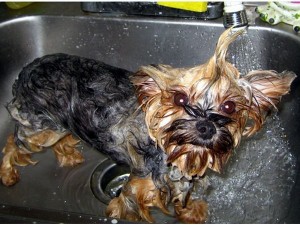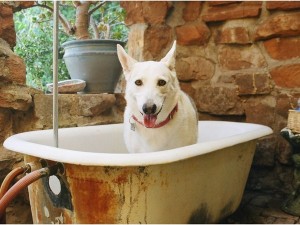I enjoy the opportunity to contribute my veterinary perspective to other pet writers. My friend and fellow media cohort, Carol Bryant, recently published this article on Dogster.com: Dog Shampoos Can Be More Harmful Than You Think
Dog food, dog treats, flea and tick prevention: These product categories have all been given a closer than usual scrutiny in recent years, and with valid reason. We know that certain ingredients can cause our canine family members to get sick or worse. Garbage in, garbage out, and keep those toxic and potentially damaging ingredients away from us!
But what about the ingredients in pet shampoo? Have you considered wheter what we use to lather, rinse, and repeat on Fido is really all that good for him? Not all shampoos for pets are created equal, and moreover, many of them could actually harm your dog.

You know I really don't need a bath, right?
Shampoos can cause extreme reactions:
When Laura Hughes took her 3-year-old Pomeranian Ginger to the groomer recently, she never expected the shampoo could poison her dog. The diligent dog mom noticed the dog’s tummy was red after bathing her, to the point that the dog was in pain when her skin was touched. Luckily, Hughes rushed her dog to the vet where a diagnosis was made. X-rays of the abdomen showed edema and blood in the dog’s lungs. Fearing for Ginger's life, the vet acted quickly and Ginger eventually recovered. Hughes attributes the reaction to a shampoo used by the dog’s groomer. That shampoo contained D-Limonine, a botanical oil extract. In interviews, the dog’s veterinarian concurred that this was the most likely cause of the reaction. I could not find anything specifically pointing to D-Limonene causing harmful side effects in pets, but be sure to do a patch test on an area of the dog’s skin prior to usage. Also, consult your vet.Know what it's that bottle before you lather up on Fido.
“When choosing a general shampoo for your pets, it's important that you select an option that is appropriate for your canine or feline companion over those created for humans,” says Patrick Mahaney, VMD/CVA. “Be especially cautious in choosing a shampoo for your cat, as they are extremely sensitive to the toxic effects of essential oils -- tea tree oil, etc.” Worried about fleas and ticks? Using a gentle shampoo with a citrus base such as orange or lemon acts as a good flea deterrent. Peppermint oil, too, when safely diluted with water, acts as a great in-home spray for areas where insects might enter, like doors and windows. Pet shampoos can also have harmful side effects on people. Phytosphingosine is blamed for triggering one woman’s asthma attack, which was so severe the woman died. She was bathing her dog and did not know about the ingredient. The FDA has issued a warning about phytosphingosine on its website.Here’s what to look for and what to avoid in dog shampoos:
Rule of thumb: If you can’t pronounce it, you probably shouldn’t be lathering Fido in it. The same holds true, in my household, for pet food and treat ingredients. There are many eco-friendly shampoos on the market these days, but not all are created equal. Biodegradable shampoos indicate that your soap residue is not going to harm the water supply or Rover’s fresh coat. Dog shampoos that are pH balanced are more in tune with the natural balance of acid in a dog’s skin. Consult with your dog’s veterinarian before making any changes or additions to what you put on his skin. A hypoallergenic combination of ingredients is mild and designed for dogs who show reactions to other types of shampoos. Here's a tip: Flip it around. I ignore the front of boxes, cans, bottles, and sprays. Instead, I flip the product around and read the ingredients first. The fluffy white dog on the bottle of shampoo does not necessarily mean my dog needs to lather in this stuff. You should know what is going on the coat and potentially into Fido’s bloodstream.
The reason I decided to research this piece: Dexter Does Dirt!
Synthetic ingredients can irritate and aggravate the skin of dogs with allergies, so avoid anything less than organic. Residue left behind on the skin can also cause itching, even with the safest shampoo.
Keep human shampoos away from dogs, as these contain chemicals that are too harsh for a pooch’s delicate skin. Human shampoos tend to irritate and dry out a dog’s skin.
Like people, dogs have skin types: Normal, dry, and oily. Skin flaking may indicate dry skin, while oily skin will leave a residue-type "sensation" when you run your fingers through a dog’s coat. If neither of these issues is present, then skin is considered normal. A veterinarian can assist in determining skin type.
Conditioners, detanglers, and crème rinses follow the same principles as above. Sometimes, too much of a good thing can be a bad thing.
Avoid harming your dog by asking the groomer what shampoo he or she is using, be sure you know what ingredients it contains, and run it by your dog’s vet for a double check.
What are you using to bathe your dog? Do you know what shampoo your groomer uses? Has this ever crossed your mind before? Weigh in, we’re up to our ears in lather!
Thank you for reading this article. Your questions and comments are completely welcome (I’ll respond).
Please feel free to communicate with me through Twitter (@PatrickMahaney) and follow my adventures in veterinary medicine by liking Patrick Mahaney: Veterinarian Acupuncture Pain Management for Your Pets on Facebook.
Copyright of this article (2012) is owned by Dr Patrick Mahaney, Veterinarian and Certified Veterinary Acupuncturist. Republishing any portion of this article must first be authorized by Dr Patrick Mahaney. Requests for republishing must be approved by Dr Patrick Mahaney and received in written format.






